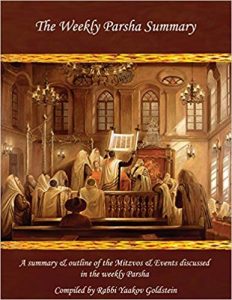Parshas Tzav
Pesukim: 97 [Siman: צו ]
Haftorah: Yirmiyahu 7:21-28[1], 9:22-23
Number of Mitzvos: There is a total of eighteen Mitzvos in Parshas Tzav; Nine positive commands and Nine negative commands. The following are the commands in the chronological order that they are brought in the Parsha.
A. Positive: 1. Mitzvah 131/Positive 59: To remove the ash from the altar [i.e. Terumas Hadeshen]. 2. Mitzvah 132/Positive 60: To keep a fire constantly alit on the altar and to daily light a stack of wood on the altar.[2] 3. Mitzvah 134/Positive 61: For the Kohanim to eat the leftovers of the Menachos. 4. Mitzvah 136/Positive 62: For the Kohen Gadol to offer a daily Mincha offering in the morning and afternoon. 5. Mitzvah 138/Positive 63: For the Kohanim to perform the Chatas offering according to the laws mentioned in the Torah. 6. Mitzvah 140/Positive 64: For the Kohanim to perform the Asham offering according to the laws mentioned in the Torah. 7. Mitzvah 141/Positive 65: For the Kohanim to perform the Shelamim offering according to the laws mentioned in the Torah. 8. Mitzvah 143/Positive 66: The Mitzvah to burn any leftovers of the Karbanos, which remain past their time [i.e. Nosar]. 9. Mitzvah 146/Positive 67: The Mitzvah to burn Karbanos which have become impure.
B. Negative: 1. Mitzvah 133/Negative 73: The prohibition to extinguish a fire from on the altar. 2. Mitzvah 135/Negative 74: The prohibition to bake the leftover Menachos into Chameitz. 3. Mitzvah 137/Negative 75: The prohibition for the Mincha of a Kohen to be eaten, and rather it is entirely offered to G-d. 4. Mitzvah 139/Negative 76: The prohibition to eat from the Chatas offering which is offered in the Heichal. 5. Mitzvah 142/Negative 77: The prohibition to have any leftovers from the Toda offering, or other offerings, left until the morning [i.e. Nosar]. 6. Mitzvah 144/Negative 78: The prohibition to eat Pigul, which is a Karban that was slaughtered or offered with intent to offer or eat past its time. 7. Mitzvah 145/Negative 79: The prohibition to eat Kodshim that are impure. 8. Mitzvah 147/Negative 80: The prohibition to eat the Cheilev fat of a Kosher domestic animal. 9. Mitzvah 148/Negative 81: The prohibition to eat the blood of an animal or fowl. |
Rishon
- The constant fire on the altar, the Olah offering & Terumas Hadeshen:
- Hashem spoke to Moshe and told him to command Aaron and his children the following laws [of Karbanos]:
- The law of the burning of the Olah offering on the altar, is that it shall remain burning on the altar throughout the night.
- Terumas Hadeshen: The Kohen is to wear his linen shirt and pants on his flesh upon removing the ash of the sacrifices. The ash is to be placed next to the altar. He is to change clothing and remove the ash out of the encampment, to a place of purity.
- The constant fire: The fire on the altar is to remain there constantly and is not to be extinguished. The Kohen is to place wood on the altar each morning to fuel the fire. The Kohen is to arrange the Olah offering on it and cause the fats of the peace offering to go up in smoke.
- The laws of the Mincha offering:
- The children of Aaron are to offer the Mincha offering to the altar.
- They are to remove three fingerfuls of the fine flour of the Mincha, including its oil and all of its frankincense, and offer it on the altar.
- The remainder of the Mincha is to be eaten by the Kohanim in the courtyard of the Ohel Moed. It is to be eaten as Matzah, and not Chameitz. It is considered Kodesh Kodashim like the Chatas and Asham.
- Every male Kohen is allowed to eat its leftovers. This law applies for all generations.
- Whatever touches the Karban becomes Holy.
______________________________________
[1] So is followed by Chabad communities. However, Ashkenazi and Sepahardi communities read until verse 8:3 and then add the verses 9:22-23
[2] See Minchas Chinuch ibid that according to the Rambam the Mitzvah is to make sure that a flame is always alit on the altar, while according to the Chinuch the Mitzvah is light a pile of wood on the altar every morning and evening.


 Donate
Donate
Leave A Comment?
You must be logged in to post a comment.